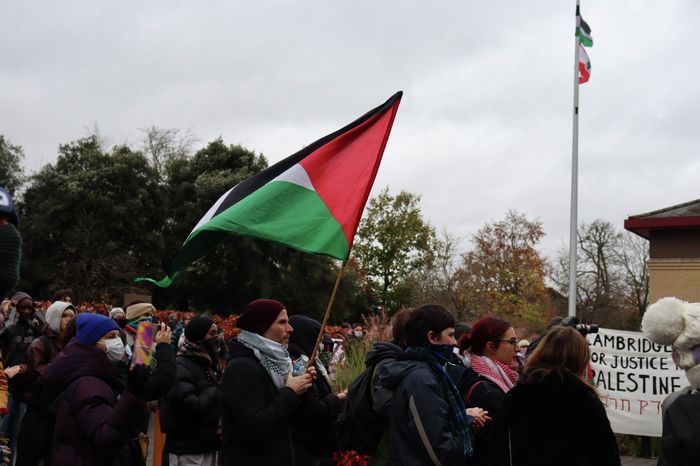Pro-Palestine protesters re-occupy Senate House lawn
Members of Cambridge for Palestine have occupied the Senate House lawn as an act of escalation against Cambridge University

Student members of the activist group Cambridge for Palestine (C4P) occupied Senate House lawn earlier today (27/11), stating that the “Cambridge encampment is back”.
This comes after members of C4P occupied Greenwich House last Friday (22/11) in its first major escalation since the encampment closed in July.
The escalation is in response to the University “breaking” its agreements regarding ongoing arms investments. C4P have stated that they have been “left with no [other] option other than principled escalation”.
“The Cambridge Liberated Zone has expanded and will continue to do so,” they added.
This comes after the University recently admitted to delays in its arms review, with deadlines being pushed back to the end of the academic year.
In a pro-Palestine rally last Saturday (23/11), the group designated Greenwich House as a “new liberated zone for Palestine,” later refering to the building to “Kanafani House”.
Varsity understands the building to be hosting at least five protesters, with the inside decorated with Palestinian and Lebanese flags. These flags were also flying from the flagpole outside the building last Saturday (23/11).
Greenwich House is a University administrative building which houses its estates, finance and human resources divisions. The building was previously occupied by the climate group, Zero Carbon Society who were forcibly removed after a court order ruled their occupation illegal.
The occupation of the Senate House lawn marks the group’s second occupation since it agreed to dismantle its encampment in the summer, after Cambridge agreed to review its defence investments.
In an Instagram post published earlier today, C4P reiterated their demands, requesting that the University “name and recognise the genocide in Gaza” and “commit to a public forum on divestment open to students, faculty, staff and community members”.
The activist group stressed the need for “public accountability, in the form of an open hall” between Cambridge’s Investment Management team, administrators, and broader University community to make “meaningful steps towards divestment”.
The group has made additional demands including reversing the 2020 adoption of the IHRA definition of antisemitism, instead adopting the Jerusalem Declaration. The Jerusalem Declaration claims that the IHRA definition places “undue emphasis” on the state of Israel in its definition of antisemitism.
Alongside this, they are demanding the University to recommit to the agreements made with C4P in July this year.
C4P claimed that the University had pledged that six students and six academics nominated by C4P would be part of the arms investment working group. However, according to the activist group, University officials have “limited” the participation of students to two members.
The pro-Palestine group has accused Cambridge of “avoid[ing] transparency by siloing discussions of divestment to closed-door conversations”.
On Saturday (23/11), student protesters attending a rally organised by C4P also condemned Trinity College’s policy on arms investments after their master stated that the College has “no interest in divesting from arms companies”.
These companies include Elbit Systems which produces 85% of the drones and land-based equipment used by the Israeli military. One speaker described Trinity master Prof Sally Davies’ comments as “unconscionable evil”.
 News / Under 3% of applicants for Cambridge academic jobs are successful7 April 2025
News / Under 3% of applicants for Cambridge academic jobs are successful7 April 2025 News / News in Brief: cats, Camelot, and construction woes6 April 2025
News / News in Brief: cats, Camelot, and construction woes6 April 2025 Comment / Cambridge’s gossip culture is a double-edged sword7 April 2025
Comment / Cambridge’s gossip culture is a double-edged sword7 April 2025 Sport / Previewing the 170th Boat Race7 April 2025
Sport / Previewing the 170th Boat Race7 April 2025 Lifestyle / Which college brunch should be next on your list?6 April 2025
Lifestyle / Which college brunch should be next on your list?6 April 2025






